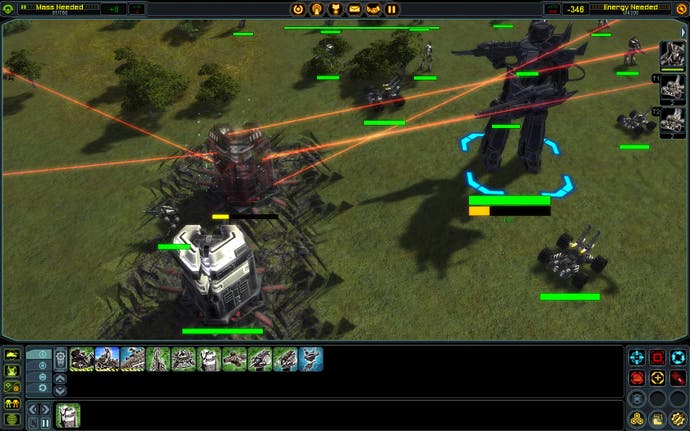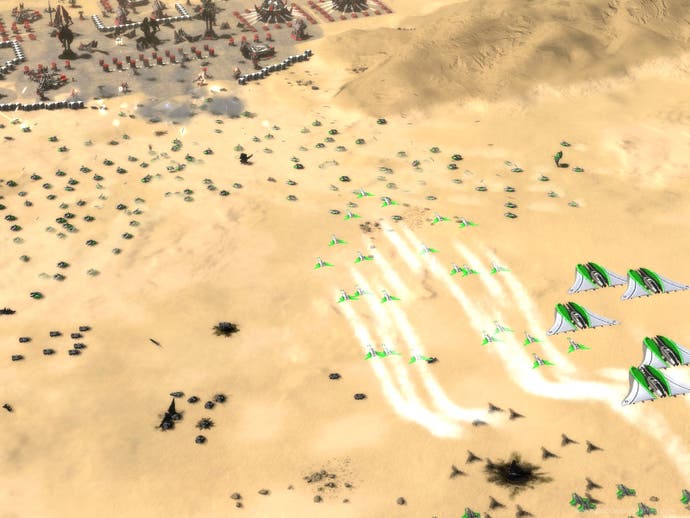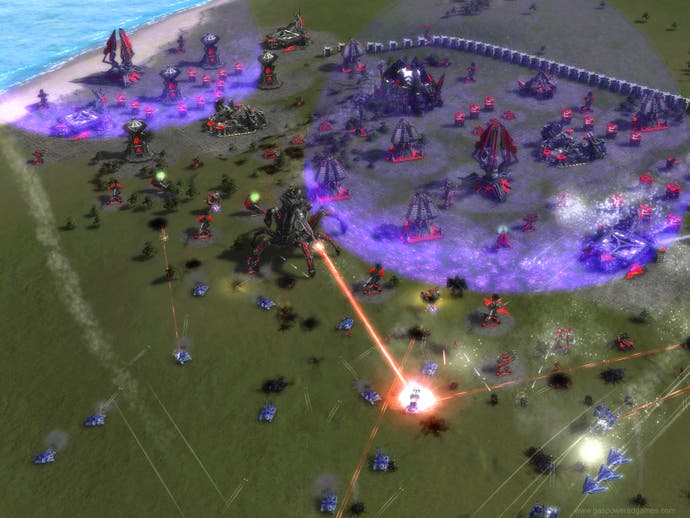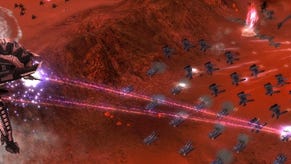Supreme Commander
Appropriate.
Every other game I ever play for the next, I dunno, million years, is going to feel flat and small and boring. Why? Because they'll only be running on one monitor. Thanks to its ingenious graphical trickery, I can play Supreme Commander on two monitors, and it does funny things to my brain. Something in it I don't usually use is being exercised, but it feels good. I feel totally in control of the game this way. I'm not entirely sure how to describe the way I'm thinking when I use those two screens. It's nothing anywhere near as static as the average DS approach of here is the action / here is the map. Rather, it's more like I'm right in on a battle one on side, while on the other I check to see if a frigate's finished building - not skipping my focus between the two, but somehow watching both at once. Only it's ever-shifting, like I have a pair of robotic eyes zooming coolly in and out at will.
I'm not entirely sure how I managed to play real-time strategy games without two monitors before. All that clumsy mousing over bits of map, hotkeys to jump to structures and only being able to manage one fight at once seems so terribly backwards compared to this. With enough practice and some sort of fiendish mod, I reckon I could control the game with two separate mice too. I'd be the ultimate General, coolly able to direct two wars at once, the look spoiled only slightly by having to glue a pointy stick to my forehead so I could use the keyboard as well. SupComm's incredible bigness (remarkably intact on just one monitor, should you be a pauper) is perhaps final proof of the surprising fact that RTS, once the most-lampooned of all PC game types, is now firmly established as the platform's most artisan genre. Built on a solid foundation of what made l'il army games so compelling in the very first place - that is, WAR! - then pumped up with ungodly sci-fi steroids, it feels like a definitive statement. In some booming, oh-so-macho voice it inarguably intones 'This. Is. How. It's. Done.'

Which is also its greatest flaw. In striving to be the ultimate RTS, it accentuates everything that those don't get on with strategy games despise the most. It's a game of constant management on multiple fronts, of the paper-rock-scissors combat mechanic, of tactical thinking and total familiarity with each of its many units. It's the Bible of RTSes - one man's revered tome is another's tedious gibberish. It knows it's preaching to the converted, however, which is why it's so unrelentingly intense. Just be warned - it's an exhausting game. There is no downtime here. Too many times, tired out and aching for closure, but knowing another sustained enemy assault was due in seconds, I tried to send a few nearby tanks into a base defended by a lone ground turret. It's just the one, I reasoned. Surely they can deal with it. But it doesn't work like that - they were wiped out, because corners can't be cut so. It's admirable consistency on the game's part, but sometimes, I just wish that it'd give me a bit of a break.
Still, SupComm's rewards for such heavy mental investment are manifold. By far its greatest achievement, though, is scale. Less from the huge unit count, but rather the sense of titanic destruction, multiple simultaneous goals and an ever-expanding game map in the campaign missions. Looking down with military detachedness from the most zoomed-out viewpoint, troops reduced to playschool shapes and colours, there's no question that this is indeed a war, and not some poxy, narrow skirmish pretending to be one.

It's very rare to have a conflict on a single front - land, air and sea assault generally have to happen in carefully coordinated tandem, rather than being the usual this, then this and now this approach. Coupled with the cleverness of the AI (actual cleverness, as opposed to just punishing hardness), this gives a sense of real importance to each battle. Victory is something to be truly proud of, rather than just the doorway to the next level. Victory means you're a great leader.
SupComm's fully aware too of how to best spend your time - the traditional tedium of unit building and resource collection is stripped down as much as it can be. Both remain a vital art, just in a very different way - if, say, you haven't got enough energy, it's because you've been lazy or haven't thought carefully about the situation, rather than you just haven't built enough little men with axes yet. If you haven't got a steady stream of battle-ready robots pouring out your factories, it's not that they've ground to a halt and the game's churlishly refusing to build them - it's just that they're building much more slowly because you're not generating enough resources to go full-pelt. It's logic, but logic born of established RTS rules. Everything in SupComm is familiar, even if you've never played its prequel, Total Annihilation - it's just that the stereotypes of RTS it retains are handled thoughtfully rather than mechanically. Joyously, too - climbing up the tech tree doesn't just give you slightly bigger tanks, but really big tanks who can deal a ridiculous amount of damage compared to the ones they've just superseded. Also, city-sized cannons, boats that can walk on land and giant spider robots. I'd suspect SupComm of having a bit of a laugh, if only it wasn't so deadly serious.

Still, it doesn't feel quite the game that its strategy stablemate Company of Heroes does. SupComm sacrifices ingenuity and elegance for intensity and enormity. It's a fiddlier game to play, and with less scope for pulling heroic victories and experimental tactics out of the hat. The interface suffers too - it's a bit cramped and overloaded with mid-90s-looking cheapo icons, while quite a few buildings look that bit too similar. And though it's graphically splendid for the most part, the landscapes you fight on look universally bland. Of course the constant superultracrazyexplosiondeath, and the seamless zooming from strategic to down'n'dirty viewpoints kind of masks that, but something more detailed and deformable would have pimped the game up enormously.
It's worth pointing out that SupComm's a hard taskmaster to your PC, too. Official specs may claim otherwise, but anyone not running it on a dual-core rig is going to suffer slowdown once the unit count starts creeping into the hundreds. Graphically, it's not too demanding (its two-screen party trick didn't upset the Radeon X1900 in my rig, for instance), but managing the AI for so many tiny tanks is a real drain on the CPU. It's smooth, though not lightning-fast, on my last-gen dual core Athlon chip, while even the cheapest Core2Duo will scoff it up. Some people may feel this is a reason to drop the score; personally, I strongly don't. Desktop dual core chips have been around for almost two years now - sooner or later there had to be a game that made multi-core processing (also now established for two out of three of the newly current-gen consoles) more or less a necessity. Let's be thankful it's a great one, and not some empty-headed Doom clone. It's unfortunate folk with older systems will be left out in the cold (or with emptier wallets), but the PC as a games platform can't be expected to hang around waiting for the idlers to catch up forever.
The overwhelming sense from SupComm (apart from the need to sleep for a week after a bout of it) is that its design brief was mega-war first, player sympathy second. The mega-war it gets absolutely right, but this is an RTS that could have bagged itself a 10 if it had reigned itself in a little, had tweaked its flow just enough so that there wasn't quite so much exhausting struggle. For all its grandeur, it'll simply feel too much like hard work for anyone who wasn't already sold on the concept - a timeless classic should have more universal appeal. It's a triumphant achievement nevertheless, a just reward for anyone who's ever lost their heart to an RTS - a love letter to the fans.




